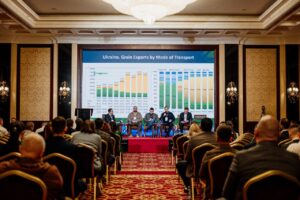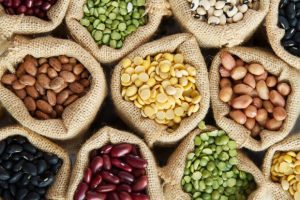
On April 18, 2024, “BLACK SEA GRAIN. KYIV” – took place one of the largest grain forums in Ukraine, which provides exclusive analytics of the agricultural market from world experts, discusses global macroeconomic and regional trends, long-term forecasts, effective communication and contacts with international industry leaders.
The event brought together hundreds of leading international producers and processors of grains and oilseeds, traders, agricultural holdings, banks and investment funds, trading exchanges, government representatives and industry associations, logistics, brokerage, insurance, surveying, legal and other companies.
The opening remarks were delivered by Sergiy Feofilov, CEO of UkrAgroConsult, which is celebrating its 30th anniversary this year.
Immediately after the greetings, the “HARD TALK” started on the topic: Future EU agricultural policy (Green Deal, Deforestation Law). Impact on the production of grains and oilseeds in the EU and Ukraine and margins/profitability of farmers.
The panel was moderated by Leonid Kozachenko, President of the Ukrainian Agrarian Confederation.
The President of the UAC outlined the situation on the grain market in the extremely difficult conditions of the war and emphasized such important issues as transport and logistics, problems of financial support for agricultural market participants, European integration processes and challenges.
Leonid Kozachenko also emphasized the importance of river navigation, in particular, the importance of rebuilding the Kakhovka dam and building more modern locks than those that existed before.
Oleh Khomenko, CEO of the Ukrainian Agribusiness Club, focused on trade barriers and disputes and negotiations with Poland and the EU.
The UCAB CEO noted: “Yesterday, in an interview, the Polish president said that there is an American farmer in Ukraine, that our land owners are Americans. How absurd is it that such issues are discussed at the level of presidents? And yet everyone realizes that this is not the case. If we are talking about large agricultural companies, if we analyze our market structure in the State Statistics Committee, we have only 10% of land in large agricultural companies.”
He added that there are important events to come in the EU, such as the European Parliamentary elections and the appointment of a new European Commission. In addition to this, the EU Council presidency will be assumed by Hungary in July and Poland in January.
Volodymyr Pugachev, Executive and Regional Director for Eastern Europe of the Danube Soybean Association, spoke about the innovations in the EU for soybean producers.
“The supply of soybeans or its products to the European Union from January 1, 2025 (pay attention here, as it already affects this year’s harvest, which will be) will require a traceability certificate along with the geo-coordinates of the field and confirmation of the absence of deforestation… That is, it is necessary to somehow confirm that after 2020 there was no deforestation on the field where the soybeans imported to the EU were grown.
In practice, this means a change in the whole classical approach to the supply of agricultural products, as they cease to be a “bulk commodity” and require full traceability, what is called “hard identity preservation.”
“The main problem is that the European bureaucracy has not been able to introduce clear implementation rules so far,” said Pugachev about the EU EUDR regulation.
Mykola Gorbachev, President of the Ukrainian Grain Association, spoke about logistical problems and solutions and predicted the price situation on the grain market: “We predict that we will harvest somewhere around 76-77 million tons of grains and oilseeds next year. This is a bit less, of course, than before. Our forecast is based on the fact that weather factors will not be as favorable as last season. We forecast exports of grains and oilseeds at around 43 million tons. This season, we forecast about 53 million tons, which means we will have a 10 million ton decrease – 6 million tons less corn and 4 million tons less wheat exports. Soybeans will increase slightly, and other crops will increase slightly. Due to this decrease, I think that the norms set by Europe for us will be enough for us to trade corn with Europe within the limits without additional costs.
Our forecast is that the price will increase slightly. At the end of the season, we will see that the price will go up a bit in Ukraine. By the end of May, Ukraine will be able to export almost all of its stocks, and in June we will have almost nothing. The global price will go up a bit. In Europe, the yields will be lower. That’s why prices will be a bit better for our farmers.”

Ukraine should regulate its role in the issue of grain policy in global markets, in particular, it concerns phytosanitary issues, new approaches to the use of pesticides and issues of traceability of grain origin, the Ministry of Economy said on Wednesday.
“Usually we adopt EU policy and implement it in Ukraine, including trade issues. But this is not always necessary. We shall develop our own position. In particular, my task, as chairing the International Grains Council, is to attract attention of global markets to the grain policy of Ukraine,” Trade Representative of Ukraine Taras Kachka said.
The Ministry of Economy said that on June 8 Kachka met with GAFTA Director General Jaine Chisholm Caunt and members of the organization’s council to discuss possible cooperation between Ukraine and the International Grains Council and GAFTA. The ministry called this meeting especially relevant on the eve of the beginning of Ukraine’s chairmanship in the International Grains Council.
“It is important to deepen the dialog between trade institutions, such as the International Grains Council, GAFTA, WTO, because finding a balance in international trade is directly related to ensuring global food security. We see more and more ties between the business community of Ukraine and international trade institutions and consider the development of this dialogue is key in our trade policy,” Kachka said.
The Ministry of Economy recalled that GAFTA (Grain and Feed Trade Association) is an international trade association headquartered in London, consisting of grain traders, brokers and other specialists in the international grain trade. Founded on November 17, 1871 it has over 1,900 members in 100 countries.

Unscrupulous agricultural producers, amid a low harvest, are trying to disrupt the previously concluded forward contracts for the supply of grain, which could collapse the grain market of Ukraine and provoke disastrous results both for the agricultural sector and for the country’s economy as a whole already in the current marketing year, Ukrainian Grain Association (UGA) President Mykola Horbachev believes.
“Today, many unscrupulous producers, seeing an increase of market prices, want to refuse to fulfill the previously concluded contracts, in fact to make a default. And we are not talking about those agrarians who lost crops due to drought or other weather disasters, but those who had good harvest,” he explained in an exclusive commentary to the Interfax-Ukraine agency.
Because of this, Ukraine may lose a source of about $11-12 billion to finance the agricultural sector, he said.
Horbachev also said that companies that did not suffer from drought in some regions of the country are trying not to fulfill the previously signed contracts for the supply of grain, aiming to get excess profits at the expense of counterparties. Such unfair actions will inevitably lead to both economic and reputational losses for the entire economy of the country.
According to the UGA assessment, in the spring, the agrarians contracted about 6 million tonnes of maize of the current harvest on forward contracts at a price of $150-160 per tonne, thus receiving financing for the sowing campaign.